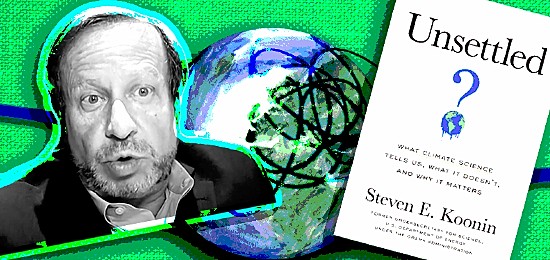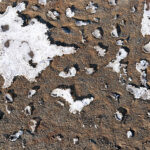A friend from British Columbia sent me a video link to an interview conducted by the Hoover Institution with Steven Koonin, the former undersecretary of science at the Department of Energy during President Obama’s administration.
Koonin authored a 2021 book entitled, Unsettled: What Climate Science Tells Us, What it Doesn’t, and Why it Matters. Koonin is a theoretical physicist. He questions the science behind climate change. The interview is a compelling discussion that sheds doubt on the entire climate change narrative, which undoubtedly comes across in the title and subtitle of his book.
So what was the initial reaction when it came out in 2021?
A book review in Scientific American is entitled, A New Book Manages to Get Climate Science Badly Wrong. Koonin calls our knowledge of climate change “consensus science” coming from compilations of scientific data that politicians subsequently curated.
A second review published in Yale Climate Conversations by a former student of Koonin points out the obvious in his opening paragraph:
“I would normally ignore a book by a non-climate scientist promising ‘the truth about climate science that you aren’t getting elsewhere.’ Such language is a red flag. But I’ve known the author of ‘Unsettled’ since I took his quantum mechanics course as a Ph.D. student at Caltech in the 1970s. He’s smart and I like him, so I’m inclined to give his book a chance.”
The review notes the flaws that have created a series of biases that reflect the kind of climate science doubt coming out of institutions like The Heartland Institute, the American conservative and libertarian public policy think tank that got its start with the Koch brothers and money from the fossil fuel lobby and continues to cast doubt on the scientific consensus around climate change. The Yale review points out that Koonin’s research in the runup to writing his book involved balancing the expertise of climate scientists to the tune of 97, with 3 contrarians with the latter having few credentials and little credibility on the subject. Koonin appears to have treated the two arguments with equal weight and thus concluded that the existing climate science is unsettled.
What is disconcerting about the video interview is how plausible Koonin sounds, and how well the questioner feeds into the narrative with an almost naive “you got to be kidding me” expression anytime the theoretical physicist casts doubt on established climate science.
I wrote back to my friend with these comments.
There is no doubt that climate models continue to be perfected and that we still have to do a lot of data gathering. I went on to point out that the Hoover Institution has strong links to conservatives in the U.S. Furthermore, Koonin is a theoretical physicist, not a climatologist.
Koonin’s comments are factual about warming as a four-century phenomenon and not just something starting in the mid-20th century when we began tracking carbon dioxide levels in the atmosphere. The problem with the comment is it has no context. So here is the background story.
As a former medievalist, I have written about Europe’s Little Ice Age. You can read
about it here where I describe how Europe’s discovery of the Americas leading to a holocaust that wiped out more than 90% of its indigenous people may have been the likely cause of The Little Ice Age that had followed a benign warming climate period in Europe. In the absence of large native populations, the Americas, particularly North America, reverted to a natural environment to become a giant carbon sink. Hence temperatures fell and it took until the Industrial Revolution for this part of the world to warm up again.
I also suggested to my B.C. friend that he read a
climate risk perspective recently published in the Bulletin of Atomic Scientists that further challenges the parochial notion that the science of climate change is supposedly
“unsettled.”
Another Koonin
“observation” that irked me was his assertion that cold temperatures pose a greater threat than heat related to human mortality. This is nonsense and may reflect that it comes from the mouth of someone living in the relatively temperate mid-latitudes of the Northern Hemisphere. An article in
yesterday’s Washington Post portrays just how imposing a threat heat has become to the lives of those living on the Deccan plateau that spans Pakistan and India.
Being skeptical about IPCC reports is nothing new. These annual briefings are long and tedious to read and represent a compendium of blended data along with probability assessments (rating the chances between 1 and 99% for various phenomena and changes to occur). I have read them and provided summary highlights from them on this site. For reference, type in the search window at the top of the web page “IPCC report” and you should be able to find pertinent content.
What Koonin doesn’t state which surprises me since he is a theoretical physicist, is that we have known since
Svante Arrhenius, a Swedish chemist published
On the Influence of Carbonic Acid in the Air upon the Temperature of the Ground, that there is a link between warming and CO2 with the onset of the Industrial Revolution adding to a growing atmospheric greenhouse gasses effect. Today, we are finding out every decade just what that impact is and the planet’s response.
So, after watching the Hoover Institution’s interview, I see nothing “unsettled” about conclusions made by climate scientists. Koonin is no expert on climate and is painfully wrong in his assessment of climate change. What I do agree with him on is that interference by politicians continues to muddy the waters repeatedly with their self-serving exercises to justify doing next to nothing to mitigate and adapt to the accelerated pace of planetary warming.
There is a problem with people who are known for expertise in one scientific field pretending to be experts in another. They can sound intelligent but be anything but on the topic at hand. That is the Koonin story in a nutshell.
















